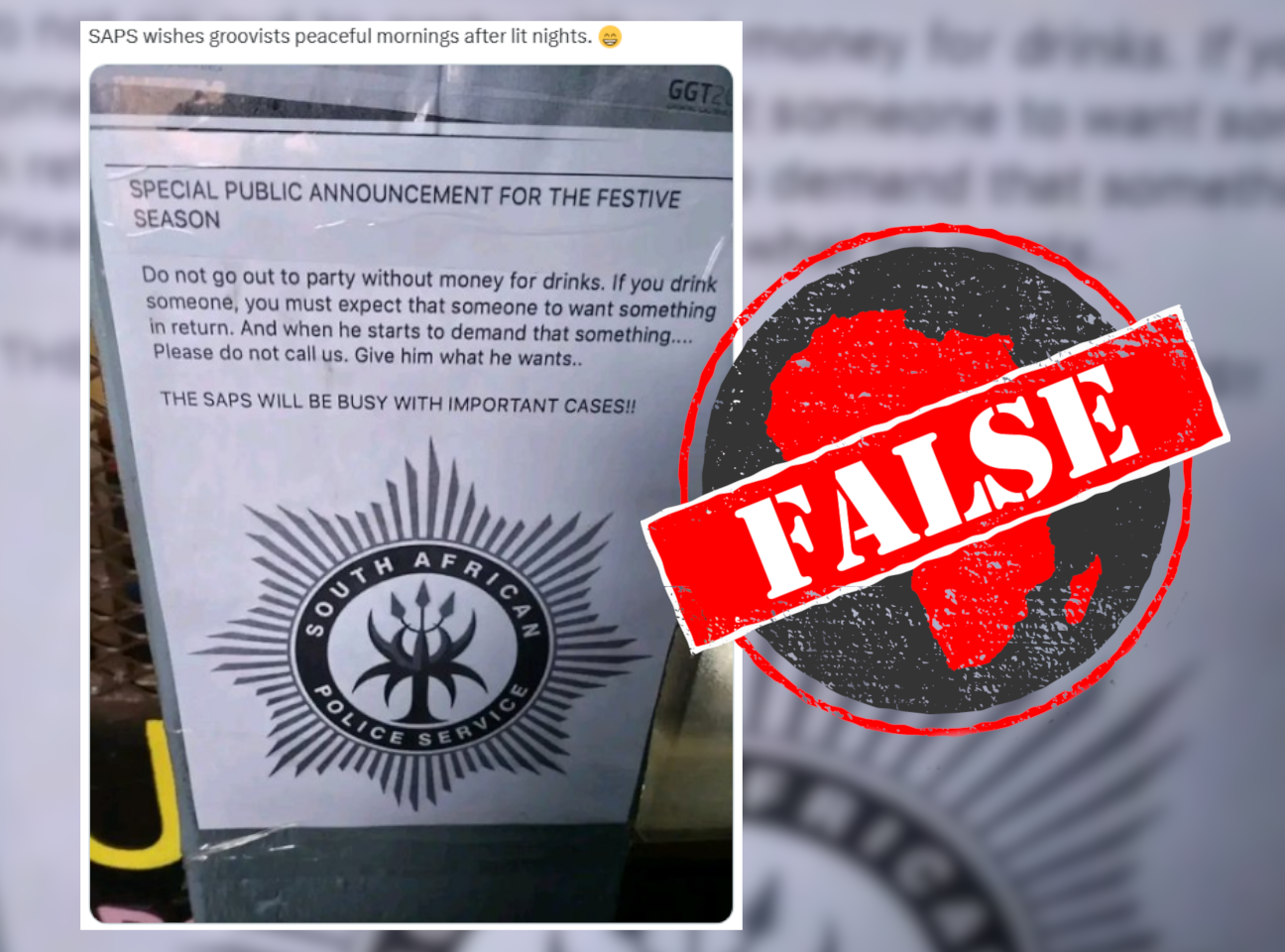IN SHORT: The South African Police Service rubbished claims that they had made any announcement, like one circulating on social media, that legitimised expecting sex after paying for someone’s drinks.
A fabricated statement falsely attributed to the South African Police Service (SAPS) has been circulating on social media in November 2023, claiming to be a “special public announcement for the festive season”.
The statement makes a series of disturbing claims that seem to imply a justification for sexual assault, and instructs people “not to call [the police]”.
The statement was posted on X (formerly Twitter) here on 26 November, and was viewed over 500,000 times within a few days.
It also appeared on Facebook, with examples here, here, here, here, here, here, here, here, here, here, here, here, here, as well as here, posted by a radio station.
One user responded to the post with “This can’t be real!?!”. Well, it’s not. Here’s why.

Sexual coercion
The announcement was posted as a photographed document that includes the Saps logo and the headline: “SPECIAL PUBLIC ANNOUNCEMENT FOR THE FESTIVE SEASON.”
It reads: “Do not go out to party without money for drinks. If you drink someone, you must expect that someone to want something in return. And when he starts to demand that something.... Please do not call us. Give him what he wants.. THE SAPS WILL BE BUSY WITH IMPORTANT CASES!!”
This appears to describe what is frequently an example of sexual coercion, where paying for someone’s alcoholic drink is used as an excuse to pressure them into sex. Sexual coercion is a form of sexual assault where someone is pressured, tricked, threatened, or forced into an unwanted sexual activity in a way that is not physical. “Coercion can make you think you owe sex to someone”, according to the US Office on Women’s Health.
This coercion could occur on its own, or in combination with an inability to say no due to the effects of alcohol. You can learn more about consent and coercion in South African law here.
Police debunk announcement
As an Independent Online article noted, while many social media users seemed to find the statement funny, others pointed out the disturbing attitudes it promotes. “This is concerning,” wrote one user. “The people laughing in the comments are disgusting,” another wrote in response to one of the posts. “Look at all the rapists excited about this false information,” said another.
On their X account, the police made it clear the posts showed a fabricated document. “It is fake,” they said, and urged people not to share the announcement.
Aside from this debunking, there are also clues to be found in the announcement itself. There are grammatical errors in the text, and the use of all caps, ellipses for emphasis and multiple exclamation marks are all signs that the statement is not official.
The context is also a clue. If this had been a genuine public announcement from SAPS, you might expect it to also have been posted on their official social media accounts or website.
The circulation of the fake notice coincides with South Africa's observance of the UN's 16 Days of Activism for No Violence against Women and Children campaign.
On their website, SAPS states that no victim reporting a sexual offence can be turned away by the police, and details the procedures that the police must follow in these situations under South African law.
For more about the issue of sexual consent and how to navigate it, read this article by public health media organisation Bhekisisa.
Republish our content for free
For publishers: what to do if your post is rated false
A fact-checker has rated your Facebook or Instagram post as “false”, “altered”, “partly false” or “missing context”. This could have serious consequences. What do you do?
Click on our guide for the steps you should follow.
Publishers guideAfrica Check teams up with Facebook
Africa Check is a partner in Meta's third-party fact-checking programme to help stop the spread of false information on social media.
The content we rate as “false” will be downgraded on Facebook and Instagram. This means fewer people will see it.
You can also help identify false information on Facebook. This guide explains how.


Add new comment